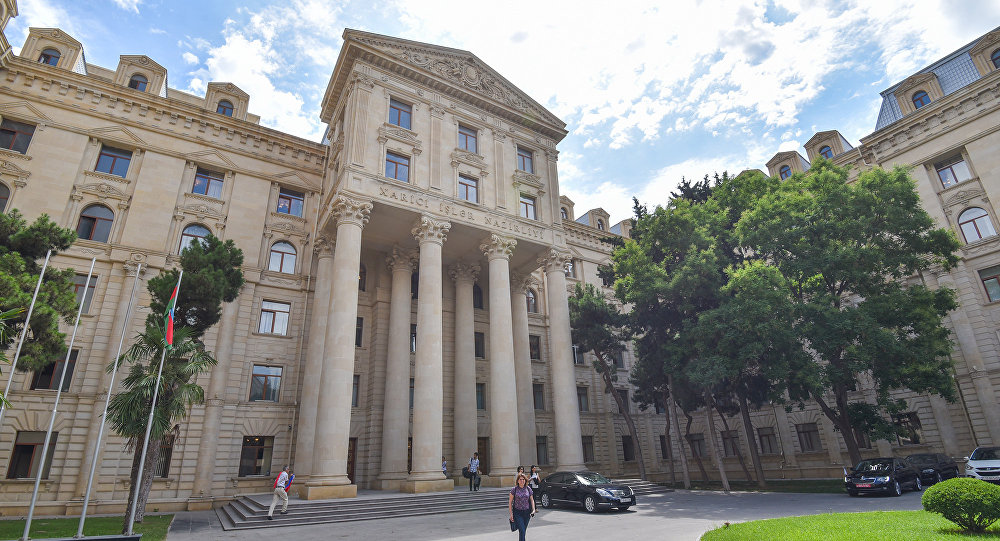Foreign policy officials from Azerbaijan focused the attention of the Organization for Security and Cooperation in Europe (OSCE) on the Nagorno-Karabakh conflict, as the OSCE celebrated the adoption of the Helsinki Final Act on Wednesday.
“On the occasion of 43rd anniversary of Helsinki Final Act, we urge all OSCE Member States to demand in a firm and unequivocal manner from Armenia to comply with its obligations under the Helsinki Final Act and other international legal instruments, cease use of force against Azerbaijan and withdraw its troops from the occupied territories of Azerbaijan,” Azerbaijan Foreign Ministry’s Spokesperson Hikmat Hajiyev said in a statement issued on August 1.
“Non-compliance by Armenia with its Helsinki Final Act and other OSCE obligations and their continuous violation, selective and double standard approaches in the application of Helsinki Final Act principles causes for protraction of settlement of Armenia-Azerbaijan conflict through negotiations and maintenance of the risks of military escalation.”
The Helsinki Final Act was signed by presidents and prime ministers from 35 countries on August 1, 1975 in Helsinki, Finland. The purpose of the multilateral, comprehensive document was to consolidate the concept of comprehensive security through intense cooperation, bridging the gap between East and West, as well as alleviating the tensions of the Cold War. The ultimate outcome of the Act was the creation of a permanent platform for nations to conduct dialogue related to security, known as the Conference on Security and Co-operation in Europe (CSCE), which was renamed the OSCE since 1995.
While the Helsinki Final Act is still considered the document that guides the work of the OSCE, Baku is not happy with the outcomes as it relates to the Nagorno-Karabakh conflict.
Sovereign equality, respect for the rights inherent in sovereignty, refraining from the threat or use of force, inviolability of the frontiers, territorial integrity of the member states, and peaceful settlement of disputes are acknowledged as the core principles of the Act. But officials in Baku are concerned that Armenia’s actions continue to be a destabilizing force in the South Caucasus region and are in violation of the OSCE’s guiding document.
On January 30, 1992, in the midst of Armenia was fighting to occupy Azerbaijan’s Nagorno-Karabakh region and managed to seize its central city, Khankhendi, both Armenia and Azerbaijan joined the CSCE.
“Since then Azerbaijan remains fully committed to its obligations under the Helsinki Final Act. [However] as the OSCE member state, Armenia in blatant violation of its commitments under the Helsinki Final Act by use of force occupied Nagorno-Karabakh and seven adjacent regions of Azerbaijan,” Hajiyev said.
“Illegal presence of armed forces of Armenia in the occupied territories of Azerbaijan is the continuation of Armenia’s use of force and threat of force policy against Azerbaijan.”
War clouds gathered in the skies of Azerbaijan with Armenia’s leadership’s launch of an all-out military campaign against the country in 1991, as the USSR was on the very edge of its collapse. Armenia fought to occupy Azerbaijan's Nagorno-Karabakh region, where ethnic Armenians had been living alongside indigenous Azerbaijanis.
The full-scale war lasted until a ceasefire agreement in 1994 and ultimately resulted in Armenia occupying more than 20 percent of Azerbaijan’s territories – the Nagorno-Karabakh region, plus seven adjacent districts. More than 20,000 Azerbaijanis were killed during the fighting; nearly one million were displaced, while another 4,000 were taken captive, held hostage, or went missing.
The OSCE has worked to help find a peaceful solution to the conflict, and in 1994 created the Minsk Group – a mediation mission that is co-chaired by France, Russia and the United States.
"A just settlement [of Nagorno-Karabakh conflict] should be based on the principles of international law, including the Helsinki Final Act and its basic principles of non-use of force or threat of force, territorial integrity, equality and the right to self-determination,” the Minsk Group co-chair from the U.S. Andrew Shaffer told Trend in March of this year.
“We are also convinced that the current status quo cannot continue in the long term and that there is no military way to resolve this conflict.”







 Russian Foreign Minister Sergei Lavrov has reasserted that Moscow has no intentions to stop the fighting in Ukraine, even if peace talks commence.
Russian Foreign Minister Sergei Lavrov has reasserted that Moscow has no intentions to stop the fighting in Ukraine, even if peace talks commence.
 Iran has refuted reports of alleged damage to Shimon Peres Negev Nuclear Research Centre located southeast of Dimona, Israel, during the recent air...
Iran has refuted reports of alleged damage to Shimon Peres Negev Nuclear Research Centre located southeast of Dimona, Israel, during the recent air...
 Iran and Pakistan have signed eight cooperation documents in various fields, and agreed to strengthen ties to fight terrorism in the region.
Iran and Pakistan have signed eight cooperation documents in various fields, and agreed to strengthen ties to fight terrorism in the region.



